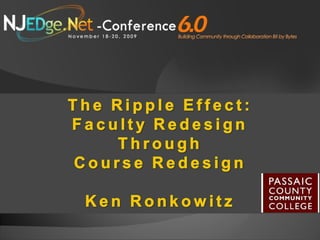Ripple Effect: Faculty Redesign Through Course Redesign
- 2. Presentation available at http://www.slideshare.net/ronko4
- 3. New technologies rise and fall so quickly that it is increasingly difficult to keep faculty updated on tools that make a difference in the classroom. Jim Rapoza - http://etech.eweek.com
- 4. How do we encourage faculty to try new technologies in the classroom?
- 6. The Writing Initiative at Passaic County Community College has a primary goal of improving writing by redesigning more than 20 GenEd courses across disciplines as writing-intensive. 2007-2012
- 7. An embedded component of the project is the use of technology by the faculty and students participating in the WI courses.
- 8. A secondary goal is to expand the number of other instructors integrating technology into their courses – to start a ripple effect in the college community.
- 9. Formal faculty development in… collaboratively creating digital content that is shared with other instructors online assessments lecture capture (Echo360) streaming media e-portfolios e-tutoring online scheduling promoting the use of the college portal (CampusCruiser) and LMS (Blackboard) These courses are online, blended, and face-to-face on three campuses.
- 10. A Taxonomy – ordered classification Technology infusion from the perspective of learner cognition. Scaffolding increasingly higher level thinking and integration skills http://www.edtechinnovators.com
- 11. from top to bottom increasingly higher level thinking and integration skills resulting in increased expectation of independence Designed for students. Being used for faculty.
- 13. What IS Emerging Technology?
- 16. LibGuides Guide Index There are 154 guides in the system: 5 private, 73 published, and 76 unpublished guides. Of the 78 active Guides, 8 were developed for WI courses currently launched…
- 17. Observe Incorporate Produce Explore Collaborate Apply Create Demonstrations of the technology at workshops, faculty institutes, Dean’s Tea, best practices, department meetings…
- 18. Observe Incorporate Produce Explore Collaborate Apply Create Incorporating a tool – passive use of technology in a Web 1.0 way. Using media, LibGuides, assigning the use of eTutoring…
- 19. Observe Incorporate Produce Explore Collaborate Apply Create Production - going 2.0 Making your own content After first faculty institute
- 20. Observe Incorporate Produce Explore Collaborate Apply Create Exploring new technology on their own. Photography blogs as critical thinking.
- 21. Observe Incorporate Produce Explore Collaborate Apply Create Collaborating with students, librarians and our mentors. Handing off WI courses to instructors for additional sections. “ Open sourcing” the content
- 22. Observe Incorporate Produce Explore Collaborate Apply Create Combining and integrating technologies. Mashups Video produced embedded in LibGuides Portfolios as CMS; faculty portfolios
- 23. Observe Incorporate Produce Explore Collaborate Apply Create Using the technology to produce new and different content or results. Media as anthology Guides used for non-class purposes
- 24. Bloom’s Taxonomy A Digital Bloom’s Taxonomy http://www.serendipity35.net/index.php?/archives/1709-A-Digital-Bloom.html
- 25. As with any learning taxonomy… Higher levels do not occur without the “lower” levels being used first. Lower levels are not a negative label. It is best when progress is made to higher levels because of self-identified needs. Students can be powerful drivers for faculty adoption. Participants need to explore on their own, abandon what does not work for them, try things that do not work for others.

